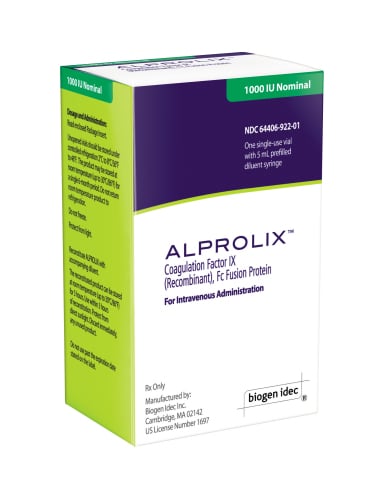 |
| Courtesy of Biogen Idec |
New, long-acting hemophilia therapies are preparing to take the market by storm. For patients, they'll require less frequent infusions, proving more convenient. But for current market leaders like Baxter International ($BAX), they could put millions in jeopardy as they take hold of the global markets for hemophilia A and B, worth a combined $7 billion.
Biogen Idec ($BIIB) nabbed FDA approval late Friday for its hemophilia B treatment Alprolix, the first in a new generation of longer-lasting drugs that treat the bleeding condition. When Alprolix launches in early May, it will go up against hemophilia B market leader Benefix from Pfizer ($PFE), a drug that scored about $400 million in U.S. sales last year.
In a Phase III study, Alprolix showed a substantially longer half-life than Pfizer's drug, Biogen's SVP of Hematology, Cell and Gene Therapies, Glenn Pierce, told FiercePharmaMarketing. While Benefix and other clotting agents require infusion two or three times a week, Alprolix can be dosed as infrequently as once every 10 days for some patients--an edge that will help it snag $23 million in U.S. sales this year, according to an investor note from ISI Group analyst Mark Schoenebaum.
"At a certain point in time … we would think that the field would move over to the use of products that last longer and decrease the burden of therapy," Pierce said. "Why would you use something two to three times a week if you could use something much less frequently, assuming it has the same safety profile? These are intravenous injections--they're tough. Patients do them themselves."
But it's Baxter that could be in real trouble when the new class of treatments catches on. Its own hemophilia B challenger, Rixubis, is part of a hemophilia business that generated $3.4 billion last year, making up more than 58% of the company's biopharmaceutical sales in 2013. And come 2015, the company will be relying heavily on those sales as it spins that unit off.
The biggest threat to Baxter won't come from Alprolix, however, but from another Biogen drug: Eloctate, a treatment that will compete with Baxter's Advate in a global hemophilia A market worth $6 billion--6 times the size of the hemophilia B market. Baxter has a lot to lose in the hemophilia A space: Advate brought in the bulk of its hemophilia revenue last year, tallying about $1.8 billion in sales, Piper Jaffray analyst Matt Miksic says. And a recent analyst survey of 33 hematologists predicted that Eloctate, which is on track for FDA approval in mid-2014, would capture up to 37% of the adult market over the next two years. Other companies are in the mix too, including Novo Nordisk ($NVO), which has its own long-acting treatment in Phase III trials.
But all hope is not lost for the Deerfield, IL-based company. Baxter has its own long-acting med in the works--though it could trail Eloctate to market by up to two years, JP Morgan analyst Mike Weinstein told the Journal.
Still, as Leerink Swann analyst Danielle Antalffy told the newspaper, a limited number of Advate patients are likely to consider switching. "This is a sticky market, so Baxter will retain market share, particularly in patients who are already doing well on Advate," she said.
- read Biogen's release
- get more from the WSJ (sub. req.)
Special Report: Top 20 orphan drugs by 2018 - NovoSeven
Editor's note: This story has been corrected to reflect that Alprolix showed a longer half-life than Benefix in a Phase III study, rather than a head-to-head trial.